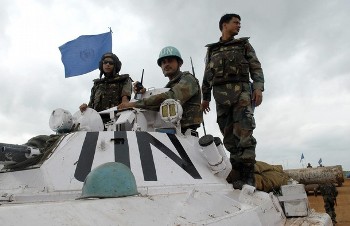Rifts emerge between Sudan’s ruling parties after Abyei ruling
July 24, 2009 (KHARTOUM) — The Sudanese government announced that it will stop remitting payments to the South on the oil revenue from the Heglig oil fields following a court ruling on the borders on the Abyei region.
 This week the Permanent Court of Arbitration (PCA) redefined the boundaries of Abyei which is on the borders of North and South Sudan.
This week the Permanent Court of Arbitration (PCA) redefined the boundaries of Abyei which is on the borders of North and South Sudan.
The Permanent Court of Arbitration (PCA) awarded North Sudan the area’s key Heglig and Bamboo oilfields placing them in the north Sudan district of Southern Kordofan.
Both the ruling National Congress Party (NCP) and Sudan People Liberation Movement (SPLM) declared their acceptance of the ruling.
Today the head of the government delegation at the Abyei proceedings before the PCA Dirdeiry Mohamed Ahmed announced that the South will not be entitled to receive any share from the oil exports from the two fields except the 2% to South Kordofan.
Ahmed said that there was money in arrears owed to South Sudan government from Abyei oil revenue that will longer be due, but did not provide a figure.
Moreover, he revealed that there is an agreement between the two parties to deduct any money paid to South Sudan from the Abyei oil proceeds from any future payments made in accordance with the Comprehensive Peace Agreement (CPA).
The wealth sharing provisions of the CPA stipulate that fifty percent (50%) of net oil revenue derived from oil producing wells in Southern Sudan shall be allocated to the Government of Southern Sudan (GOSS) as of the beginning of the Pre-Interim Period and the remaining fifty percent (50%) to the National Government and States in Northern Sudan.
Prior to the ruling, Abyei was drawn by a panel of experts to be part of South Sudan.
Senior GoSS officials have suggested after the tribunal made its award that the fate of the area under which Heglig oil fields fall will be resolved in the North-South border demarcation process.
Today the Unity State government in South Sudan issued a statement saying that Heglig belonged to South Sudan.
The statement said that the inhabitants of West Kordofan made claims to the area after oil was discovered.
“The current arbitration may not have taken into account these facts and may not help in bringing peace to the neighboring tribes”.
The move by Khartoum will likely have a severe impact on GoSS budget, which has already been hit by the drop in oil prices.
On the other hand, the Arab Misseriya tribe has demanded that the Sudanese presidency compensate them for the “unjust” ruling that took land away from them, according to one of their senior figures.
Mukhtar Babu Nimir, a Misseriya chief, told the UN sponsored Miraya FM radio that the government must build villages and provide health and education services so that they settle in the area.
However, he reiterated his tribe’s commitment to the PCA decision.
In a related issue the SPLM Secretary General Pagan Amum rejected statements by Sudanese president Omer Hassan Al-Bashir on the population that has the right to vote in the Abyei referendum in 2011.
Yesterday Bashir said that all Misseriya Abyei residents would have the right to vote in the referendum even where the land was awarded to Dinka Ngok.
But Amum said that the court’s ruling affirmed that Abyei belong to the Dinka Ngok chiefdoms and as such they are the only ones allowed to vote.
He warned that the SPLM will seek to escalate if the NCP seeks to renege on its commitments adding that Bashir’s remarks is an attempt to circumvent the court’s ruling.
The borders of Abyei are particularly important because Abyei residents were promised a referendum in 2011 on whether to become part of southern Sudan. At the same time, south Sudan as a whole has also been promised a referendum on whether to split off as a separate country.
(ST)
